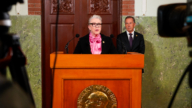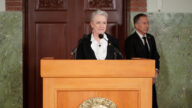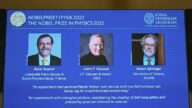【新唐人2012年10月13日讯】刚刚获得2012年诺贝尔文学奖的中国作家莫言,同时被高声祝贺,满满笑脸,激烈批评,调侃讽刺……围绕。对于这个首位得到诺贝尔文学奖的中国公民,不少大陆网友表示为他感到骄傲。但是对于莫言的写作风格、体制内作家的身份,甚至他的名字,都引起了一系列的争议。一起来看看。
10月11号,中国山东乡土作家莫言,凭借作品《蛙》获得了2012年诺贝尔文学奖。这一消息瞬间让大陆论坛和海外华人沸腾。不少人表示以莫言为豪!
与两年前刘晓波获得诺贝尔和平奖时不同,中共媒体包括《新华社》等,也高调报导了莫言得奖的这一消息。
莫言写过11部长篇小说,以及100多部中短篇小说,在中国作家富豪榜的榜上有名。他的作品充满了浓郁的乡土气息,文学手法不断创新,讲故事引人入胜。有人甚至用“富含创意的文字焰火”来描述莫言的作品。
不过,在对莫言获奖的祝贺声中,也夹杂着抗议和讽刺。许多来自中国的批评说,莫言“同体制过于紧密,不应该得诺贝尔奖。”
莫言现为中国作家协会副主席,同时也是一名中共党员。
因此,有人说,莫言讲的是荒诞离奇的故事,只敢进行体制内的批评。
有网友甚至直指莫言是第一位获得诺贝尔奖的共产党员。
而曾经当过记者的大陆作家铁流则力撑莫言。
大陆作家铁流:“我表示支持、我表示赞赏,我乐观其成。莫言那‘蛙’, 写的计划生育,这样的作品如果在50年代就‘大毒草’了,如果他的作品是什么歌功颂德呀,大唱赞歌啊,宣传‘红色’呀,那这个角度来写,那就错了,他不是这样的。”
铁流认为,莫言的作品注重真实性和人性,他说,政治应和文学评奖分开。
铁流:“第一是说真话,第二是作品要有人性,第三要有生活气息,原汁原味,还有艺术修养,这是真正要具备的东西。你不管他是体制外、体制内的,我觉得公正的是那个作品,这个奖项颁给莫言,他对中国的文学事业是一个推动。”
有关莫言的批评,除了曾经参与抄写毛泽东《延安文艺座谈会上的讲话》,他在2009年法兰克福书展中,随中共作家代表团集体退场的一段旧闻,也成为外界批评的焦点之一。
曾在法兰克福书展中,遭到中共作家代表团退场抗议的海外异议作家、流亡诗人贝岭,向《新唐人》记者披露了当时一段不为人知的内幕。
中国流亡诗人 贝岭:“他退的是我和戴晴的场,反而书展的时候他跟我讲的就很简单。他说我退场的原因,就是因为我是中国作协和新闻出版署邀请出来的,我是中国代表团的一员,我就当然只能够按照领导的指示退场。他说了一个大实话!他否认了他在《环球时报》上说‘他要(在)final discussion的时候,如果我要进场他就会退席。’他说他从来没有跟《环球时报》的记者讲那个,那个是他们杜撰的。”
莫言原名管谟业,对于他的笔名“莫言”,不少人批评,这是莫言隐喻要少惹“中共”麻烦的意思。
不过,莫言在2005年“香港公开大学”演讲时谈到,自己从小就特别喜欢说话,还特别喜欢说真话,给家人带来很大的麻烦,也经常被家人训斥。后来开始写小说的时候,就给自己起了个笔名叫作“莫言”,告诫自己要少说话,多写作。不过这个笔名并不起作用,自己还是会在不同的场合说出真话来。
相对于外界对他的高调庆祝或质疑,莫言反应则比较平淡,这位曾经笑称自己写作只是为了“一天三顿都能吃上饺子”的作家表示,感谢朋友们对他的肯定,也感谢朋友们对他的批评。
采访/李莲 编辑/王子琦 后制/王明宇
Mo Yan, Nobel Prize: Praises and Controversies
Chinese writer Mo Yan, the 2012 winner of the Nobel Prize
for Literature, is surrounded by congratulations and smiling faces, as well as fierce criticism and ridicule.
Many Chinese are proud that he has become the
first Chinese citizen to win the Nobel Prize.
However, there are controversies regarding Mo Yan’s writing
style, his writer’s identity within the system, and even his name “Mo Yan.” Let’s take a look.
On October 11, writer Mo Yan from Shandong won the Nobel
Prize for Literature in 2012 with his work “Frogs".
The news instantly caused heated discussion among Chinese
world-wide. Many people are proud of Mo Yan.
The Chinese media, including Xinhua News Agency,
published high profile reports on Mo Yan’s achievement,
which is a sharp contrast to their reaction when Liu Xiaobo
won the Nobel Peace prize two years ago.
Mo Yan has written 11 novels as well as over 100 short stories,
and is one of the richest Chinese writers.
His work combines strong local flavor, innovative literary
techniques, and fascinating storytelling.
Some even describe Mo Yan’s works as “creatively rich text.”
However, there have also been protests and
satires amongst the congratulations.
Many critics feel that Mo Yan has too close a tie with
the system and should not have won the Nobel Prize.
Mo Yan is currently the Vice Chairman of the Chinese Writers
Association and also a member of the Chinese Communist Party (CCP).
Thus, some say that Mo Yan told absurd stories and is only
willing to criticize within the system.
Some netizens even point out that Mo Yan
is the first member of the CCP to win a Nobel Prize.
However, mainland writer Tie Liu, who once worked
as a reporter, supports Mo Yan.
Mainland writers Tie Liu: “I express my support
and appreciation.
I am happy to see that Mo Yan’s “Frogs" won the award.
It is about family planning.
This kind of work in the 1950s would be eliminated.
His work is not praises or propaganda for the CCP—
it would be wrong to say that it is.”
Tie Liu believes that Mo Yan’s works focus on authenticity
and humanity.
He said that politics should be separate from literary awards.
Tie Liu: “One’s works should first, tell the truth, second,
include humanity, and thirdly, breath life into an authentic, artistic accomplishment.
All of the above mentioned are necessary,
no matter whether you are inside or outside the system.
I think that it is fair for Mo Yan’s work to win the award.
That is his push for China’s literary legacy.”
His past activities are also coming into focus, such as being
involving in the transcription of Mao Zedong “speech"
at the Yan’an Forum on Literature, which was entered
into the Frankfurt Book Fair in 2009.
He and a delegation of CCP writers then collectively withdrew.
At the Frankfurt Book Fair, Mo Yan and the CCP writers
delegation withdrew to protest against exiled poet Bei Ling,
who went on to reveal a previously untold story
to a New Tang Dynasty TV reporter.
Exiled Chinese poet Bei Ling: “He withdrew to protest against
Dai Qing and I. I talked to him during the Book Fair. It was quite simple.
He said, ‘because I am here to represent China,
I have to do what my leader said.’ He told the truth.
He denied the report of Global Times that during the final
discussion, he would withdraw if I entered the book fair.
He claimed that the reporter made it up.”
Mo Yan is the pen name for the man formerly known
as Guan Moyei.
Many people criticized that Mo Yan is a metaphor
meaning, “Don’t say anything to trouble the CCP.”
However, Mo Yan gave a speech in 2005
at the Open University in Hong Kong.
He mentioned in that speech that he loved to talk
in his childhood and was often reprimanded by his family members.
As a result, when he began to write, he took Mo Yan, meaning,
“don’t talk,” as his pen name, so he would talk less and write more.
However, even with a pen name like this,
he sometimes still need to speak out the truth.
Mo Yan reacts calmly towards praises and criticism
from the outside.
This writer, who once joked he could earn enough to eat
dumplings three meals a day, is grateful for both praises and criticisms from his friends.





























